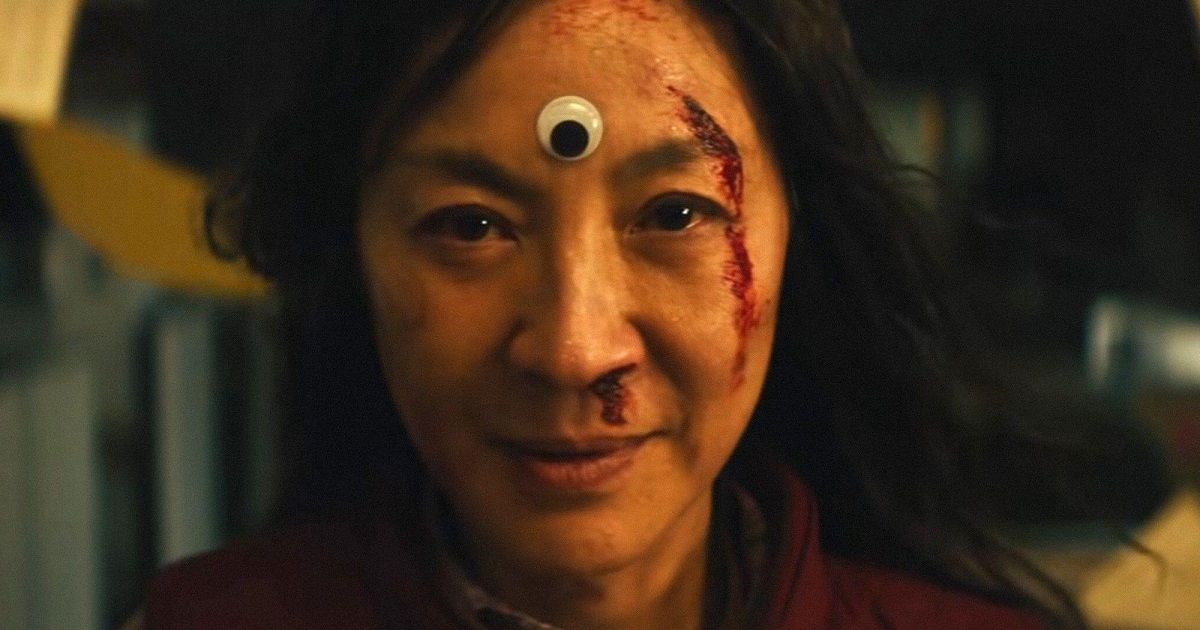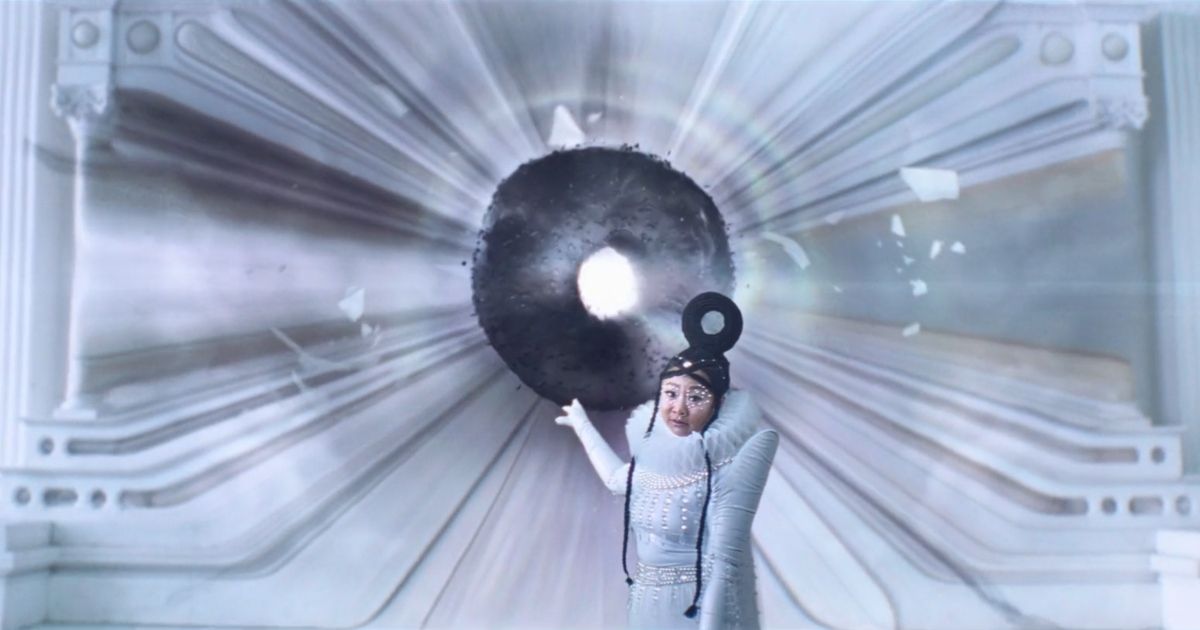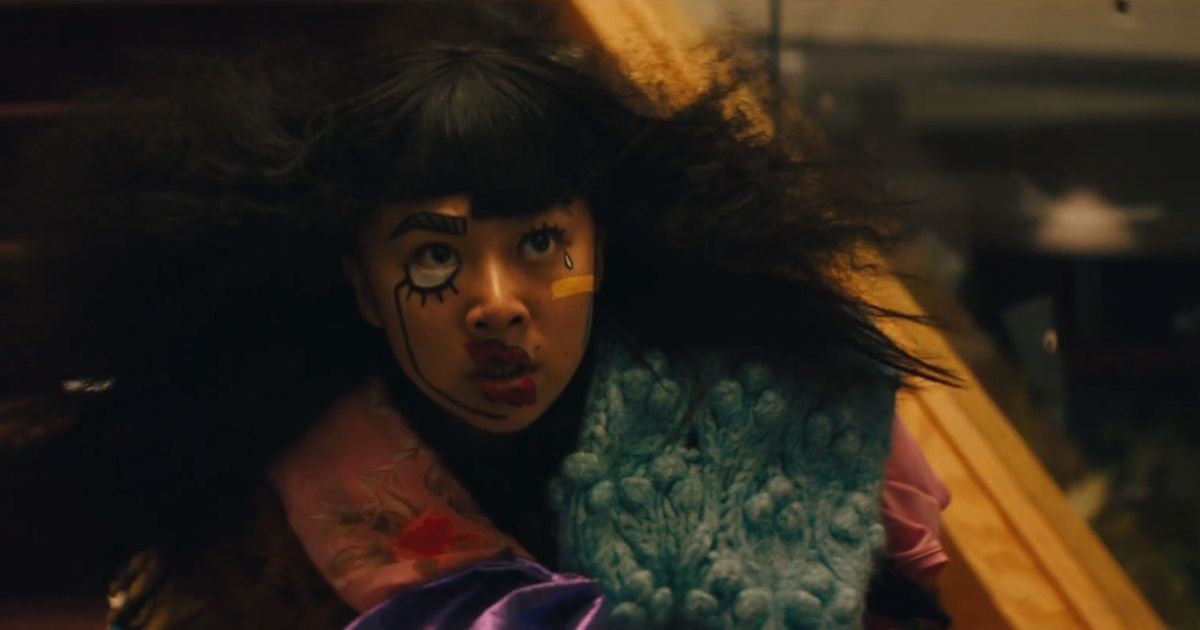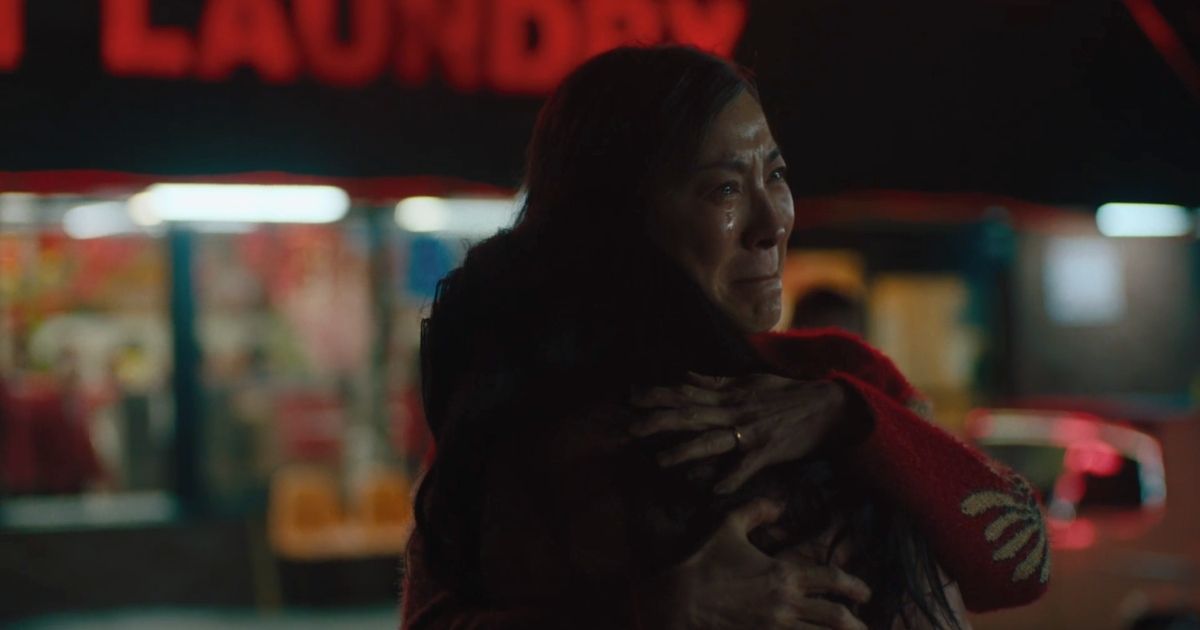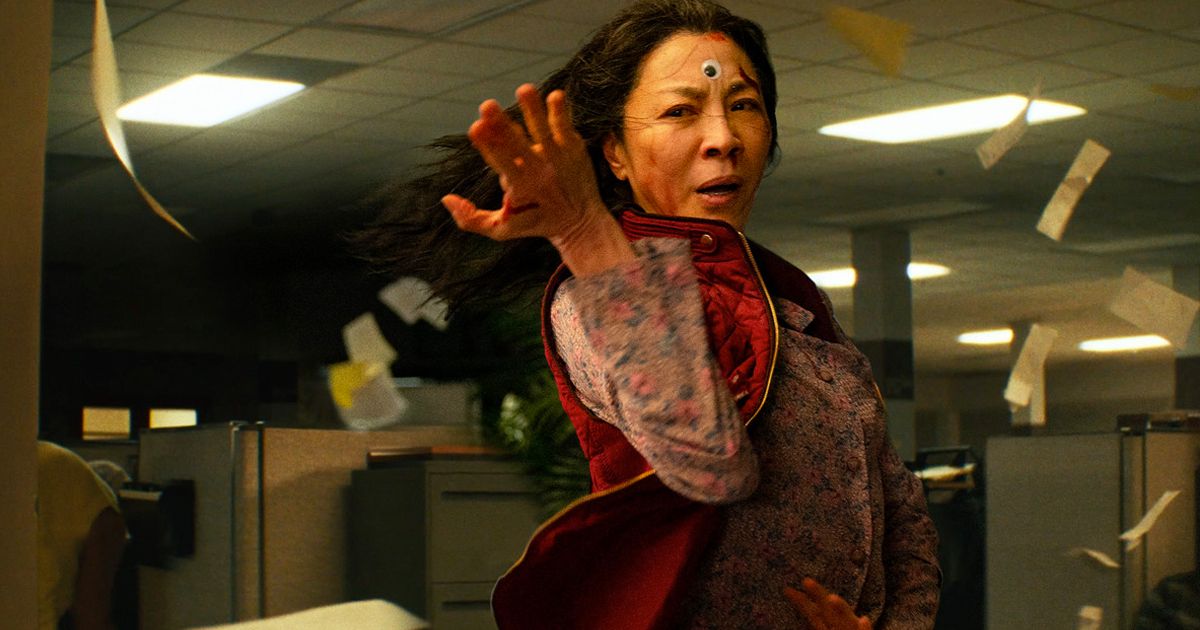Everything Everywhere All at Once is the kind of movie that struts into your life, slaps you in the face with a sex toy, and then sends you spinning into existential questions like tumbling, philosophical laundry. It is described by its co-creators, Daniel Kwan and Daniel Scheinert, as a type of "maximalism" film - about as big and ambitious as it gets. And with a title like that, nothing else would do. This movie artfully bridges the gap between summer blockbusters and arthouse cinema, and has quickly become appraised as the best movie of 2022 so far.
It's only the second movie that Kwan and Scheinert, known together as "the Daniels", have ever made. They first became noticed for their bizarre and impressive music videos, such as Lil Jon's "Turn Down For What". But their breakout movie was the fantastically strange and strangely moving Swiss Army Man, in which Paul Dano plays a man trapped on an island with a talking, farting corpse, played by Daniel Radcliffe, as his only companion - it's better than it sounds. But for many people it was not quite a palatable movie, and the directors felt the message they wanted to convey was missed because of that. As they said in an interview with RogerEbert.com, the mixed response to Swiss Army Man is what made them want to make this movie.
The reception for Everything Everywhere All at Once was ecstatic. It is A24's highest-grossing movie ever, has already won numerous awards, and is primed to impress at the Oscars. The New York Times called it a "swirl of genre anarchy", and a "bittersweet domestic drama, a marital comedy, a story of immigrant striving and a hurt-filled ballad of mother-daughter love." As the Daniels described it themselves in the RogerEbert.com interview, "We wanted this movie to be... what It’s a Wonderful Life was for Christmas, and Groundhog’s Day was for 'Groundhog’s Day,' [sic] this is a tax day movie." And yes, the base of the movie begins with the pointless drudgery of taxes and laundry.
The plot is focused around Evelyn, played by the wonderful Michelle Yeoh, who is introduced to multiple universes and different versions of herself while trying to sort out a tax audit on her laundromat business. She and her husband Waymond (Ke Huy Quan), their daughter Joy (Stephanie Hsu); her father Gong Gong (James Hong), and the IRS agent Deirdre (Jamie Lee Curtis) work together, or fight one another, across multiple realities as the plot carries them towards the end of the movie.
It is perhaps Michelle Yeoh's best performance of her career, with Vanity Fair saying that "Yeoh imbues Evelyn with moving shades of melancholy, regret, resolve and growing curiosity," and that she "makes her embrace of lead-character energy positively gripping." Originally this character was going to be the husband, played by Jackie Chan, and the decision to go with Michelle Yeoh as the lead character instead is perhaps the best decision the Daniels made out of the entire film.
Everything Everywhere All at Once takes the concepts of infinite possibilities to the highest extreme of any film to date. As co-creator Kwan said in an interview with Vulture, "The multiverse became a vessel for us to point at infinity in a way that most other premises probably wouldn't allow for." Kwan and Scheinert were inspired to make a multiverse movie by many things in their lives - from movies like The Matrix, Princess Mononoke, and Satoshi Kon's anime, to their own nihilistic leanings, to Vonnegut and slapstick humor and absurdism, to the moving power of kindness and love. They took their inspirations, their questions about life, their fears and motivations, and poured them into this movie. The result is a beautiful, chaotic struggle of the search for meaning in a meaningless existence.
So what are some of the ways these themes are represented in the movie?
***SPOILERS AHEAD!!!
Everything is Overwhelming and Nothing Matters
Perhaps the biggest theme explored in this movie is nihilism. Nihilism comes from the Latin word "nihil", meaning "nothing". It is the philosophical idea that life is ultimately pointless, devoid of any meaning. That our lives are tiny and insignificant. Evelyn's daughter Joy, though a Joy from another universe, succumbs to nihilism when she is exposed to countless realities, and they begin to blur together. Her mind breaks with the overwhelming weight of it all, and she falls into a state of chaotic numbness, renaming herself "Jobu Tupaki" (a made-up name that the creators simply enjoyed for being a combination of silly sounds). Jobu destroys worlds and kills versions of Evelyn - not necessarily because she actually wants to destroy anything, but because she simply doesn't care if that is what happens while she looks for a version of Evelyn who can understand her.
When she finds the version of Evelyn that is our main character, Joy/Jobu tells her the truth of life is that nothing matters. She goes on to add, "If nothing matters, then all the pain and guilt you feel for making nothing of your life, goes away." Jobu shows her mother the "everything bagel" that she made: a swirling mass of literally everything, which collapsed in on itself and became a pit of oblivion, pulling universes into it and annihilating them. And in the middle of that everything, at the core of the black oppressive bagel, is a white emptiness. It is the symbol of despair, dotted throughout the movie, that has come to define Jobu, and Evelyn too. Because even before she is exposed to this insanity, Evelyn is dissatisfied with her life, with having to do taxes, and laundry over and over again, and dreaming about what might have been if she had made different choices. The Daniels intentionally made this version of Evelyn the "worst" one, who failed at everything she tried.
In Zen Buddhism, there is a symbol called an ensō. It is, just like the everything bagel, a black circle with nothing inside it, painted in one smooth, unbroken stroke. It represents the emptiness of existence. But that is not the same as nothingness, though the two are often confused. Rather, it is the realization that all things are empty of permanent nature. Everything is changing, and therefore you can't grasp on to anything - it slips through your fingers the moment you try. Emptiness in Buddhism can often lead to nihilism, because it seems to imply that nothing matters. If nothing lasts, what is the point of anything, after all? Jobu Tupaki poses the same problem later in the movie, when Evelyn finds a brief moment where something good happens - that it doesn't matter, because it will soon pass anyway.
Nihilism is a common problem in western philosophy, too. From Kierkegaard to Sartre, the struggle of nihilism has pervaded the exploration of existentialism. Nihilism is also associated with the dissolution of both religion and morality, which is something that co-creator Kwan felt happened to himself at one point in his life. As he said in an interview with Polygon:
"I was very religious growing up. I was almost basically evangelical Christian until I was in my 20s. And then slowly, slowly, and then all of a sudden, it was gone. And that’s kind of what this movie was trying to re-create. That moment when Evelyn is screaming, and she’s feeling everything, and she’s completely unmoored and lost, that is the experience of losing God. That’s the experience of not having a moral center, and not having a focus of meaning, of purpose. The second half of the movie is basically her trying to do what I did, which is crawl around in the dark and the chaos, finding something worth living for, finding something worth fighting for."
In the movie, Evelyn tells Jobu at one point that what she's doing isn't right, and she replies, "Right is a tiny box invented by people who are afraid." This was Nietzsche's view of nihilism, which for him was the disintegration of traditional morality in society because of the weakening of value in Christianity. Evelyn also loses this notion of right and wrong, after becoming overwhelmed by the multiverse, and numb to her actions. In a bid to rescue her daughter (and the universe) from being sucked into the nothingness of the everything bagel, she follows the same path Joy did, breaking her mind over the weight of multiple worlds.
But she, too, succumbs to nihilism, telling a gathering of friends and family at a birthday party at the laundromat, "Another year, pretending we know what we're doing, but really we're just going around in circles." Around like laundry, like the repetitive, ominous black circle; a symbol that pervades the movie like a curse. Evelyn then signs divorce papers in one universe, stabs her husband in another, and leaves Deirdre, who is her partner, in a world where she has hot dogs for fingers. She ruins multiple lives with a dispassionate lack of care, not seeing her actions as wrong or bad anymore.
The Absurdity of Everywhere
The concepts of "everything", and "everywhere", are often drastically under-explored in art and cinema. But the Daniels expertly convey these concepts, overwhelming their audience multiple times to get across just exactly what it might feel like to experience everything, to be everywhere. It masterfully reflects our current existence with the internet, and access to everything at any time we want.
They also reference and explore absurdism in this movie, using the multiverse to highlight the absurd, such as the Ratatouille movie world only with a raccoon, or a bizarre world where Evelyn is married to the IRS agent Dierdre, and they have hot dogs for fingers. This world is deeply uncomfortable for Evelyn for many reasons, and makes the audience uncomfortable too. But Evelyn comes to see the beauty of that experience, even finding a way to love the woman who, in another universe, is trying to take her business from her. The absurd is also referenced in places such as the costume change that Joy goes through in the climax of the movie, which is very reminiscent of Dadaism and cubism, drawing on these absurdist art forms as Joy begins to fall apart before her last, desperate push for oblivion.
The humor in this movie is a direct appreciation of absurdism, inviting us to laugh at our own silly and strange existence even as we laugh at the bizarre situations in the movie. But humor is used also as a way to disarm the audience. As Kwan said in the Polygon interview:
"Humor is one element of it, but I think it’s the barrage of it all. We’re trying to get past our audience’s intellect... There are all these things we’ve built up around ourselves as a shield, and it’s making it impossible for art to penetrate in a true way... because that’s how we interact with the world now, with this very objective, distanced experience, just so we can feel like we’re in control. This movie is meant to destroy all those things, so you can’t have that control. You’re not allowed to have intellect. You can only feel, and let the experience fully move through you... So humor is a part of it, but I think the whole thing is just meant to destroy that wall of academia and intellect that we are trapped in."
Perhaps the best example of absurdism in philosophy is Albert Camus' book "The Myth of Sispyhus", which explores the analogy of King Sisyphus, who was punished by Zeus to roll a boulder up a hill for eternity. His task is not just pointless and meaningless; it is also absurd because he is aware of how pointless it is. Evelyn and Joy fall into the same trap, feeling that everything they do is meaningless - no matter how much laundry is done, no matter how many worlds are explored, nothing ever changes. The boulder rolls back down the hill, and there is no point in rolling it back up again. As Joy tells Evelyn at one point about their multiverse existence, "You're never fully there. Just a lifetime of fractured moments, contradictions and confusion." Contradiction is a big part of absurdism, as the human condition involves both the reality of a meaningless existence, and the contradictory desire for meaning anyway.
But Camus says that we must imagine Sisyphus happy - not because he ignores the fact that his existence is absurd and pointless, but because he embraces it. By welcoming the absurd rather than rejecting it, he can come to appreciate and even enjoy his existence. The movie doesn't reject the absurd either, but shows Evelyn embracing her existence, finding the good in even these tiny, fractured moments, or especially the more difficult and uncomfortable existences, such as being married to a woman she dislikes and having hot dog fingers. As Scheinert said in an interview with Vulture, "We wanted to take Evelyn somewhere that would break her brain, somewhere that she’d hate... She will look around herself, and she will be like, ‘That is my auditor. I already hate her. And she has gross hands, and she is trying to touch me.' Then we wanted it to be as challenging as possible to make her accept this universe."
Just Be Kind
Co-creator Kwan connected more with Vonnegut than Camus, though, and both creators bonded over their love for his work. Kurt Vonnegut was a writer known for his unique style of wry commentary, silly humor, exploration of the absurd situations we find ourselves in as humans, and the importance of kindness in the face of that. Vonnegut highlighted tragedy, but mixed in with slapstick comedy (there's even a book of his named Slapstick) and nuanced, gentle kindness. He was often described as cynical, but perhaps is better thought of as a "frustrated idealist." When asked what he thought the meaning or purpose of life was, Vonnegut's most clearcut answer was, "We are here to help each other get through this thing, whatever it is." And that is mirrored in Everything, Everywhere, All At Once. The simple kindness at the end of the movie is incredibly beautiful because of the difficult journey it took to get there. As Kwan said in the interview with Polygon:
"He [Vonnegut] has such a God point of view that looks at his characters as these poor ants in their ant farms, and yet somehow finds a way to see them as humans, and give them something beautiful at the same time. It’s very compelling, because I think the only way we can feel anything is if the person that is trying to tell a story first acknowledges how awful everything is, first acknowledges how dark everything is, how meaningless it all is. Then I can be like, 'Okay, now we can have a conversation, convince me why there is still beauty,' or whatever. Because if you just start with the beauty, I can’t fully engage."
So, like Vonnegut, the Daniels move us through a barrage of everything, and everywhere, infinity and overwhelming despair, all while disarming us with humor, until they finally hit us at the end with beauty and kindness. Evelyn is moved out of nihilism, not through any logical exploration or philosophical treatise, but through the simple plea for kindness from her husband. As the Daniels said in an interview with Flickering Myth, "We knew that the goal was to make a film about empathy and kindness."
This message shines through in the two speeches that Evelyn's husband Waymond makes, overlapping across two different universes. In one, faced with Evelyn, the successful martial arts actress in a world where they never ended up together, he pulls on a cigarette and says, "You tell me that it's a cruel world, and we're all just running around in circles. I know that... When I choose to see the good side of things, I'm not being naive. It's strategic and necessary. It's how I've learned to survive through everything. I know you see yourself as a fighter. Well, I see myself as one too. This is how I fight." And our primary Waymond, wounded and confused, pleads to her and the others who are about to attack them, "The only thing I do know, is that we have to be kind. Just, be kind. Especially when we don't know what's going on."
Jobu tries to get her attention back to the bagel, but Evelyn is compelled by these two conversations from Waymond. "Please, be kind," he begs her, echoing many of Vonnegut's pleas for kindness as well. According to co-creator Scheinert in an interview done by director Edgar Wright, "We wanted to play with the idea that weaknesses and strengths are subjective. Sometimes what seems like weakness is actually a superpower. You can be an ineffectual pushover with people walking all over you, like Waymond, but you’re actually holding the family together and keeping people away from mental breakdown with kindness. But no one is celebrating it."
When Evelyn comes to understand this, she embraces the symbol of Waymond's humor, the googly eyes he loves to use, putting one on her forehead - in the same place as the spiritual "third eye". Symbolically, the third eye is associated with wisdom and enlightenment. Having your third eye open means that you can see the ultimate nature of reality clearly. And for Evelyn to use a googly eye here is an even deeper meaning - the black center being surrounded by white, a direct mirror of the nihilistic everything bagel. From this moment on, she moves like a dancer, with effortless grace and a peaceful smile, fighting with love and kindness instead of hurting anyone. Evelyn begins to repair everything she has destroyed in each universe, doing so with acts of kindness and love to everyone. She even finds a way to show love to Deirdre, the IRS agent trying to take away her business. When Dierdre describes herself as a cold, unlovable person, Evelyn says, "You're not unlovable. There is always something to love. Even in a stupid, stupid universe where we have hot dogs for fingers - we get very good with our feet."
The creators have always had a difficult time with the role of violence in movies in general, and especially the use of it in their own work. They knew they'd have to use some of it in this movie, but the opportunity to fight with love instead was something they especially wanted to do by the end of the film, and it works perfectly. In the interview done by Edgar Wright, co-creator Kwan references Kubrick, saying that the scariest thing about the universe is that it is indifferent, and that however vast the darkness, we must supply our own light. "That's my job as a filmmaker. I’m going to create some light for myself and hopefully other people will be able to see it too.”
As Vonnegut writes in his book Sirens of Titan, “It took us that long to realize that a purpose of human life, no matter who is controlling it, is to love whoever is around to be loved.” Whichever version of Evelyn, or Joy, or Waymond, or Dierdre, or anyone we find ourselves with, to love who and what is in front of us. Kwan described it himself as a multiverse movie "designed to make you appreciate the one universe you're in." That the challenge is to take the worst version of Evelyn, and have her love, embrace, and appreciate it, not wanting to be anywhere else.
But Jobu is unconvinced. She wants the peace of oblivion away from the chaotic swirl of existence. Evelyn tries to hold her back from jumping into the void, but Jobu begs her to let go. She is tired, and done with it all. And, in perhaps the best moment of the entire movie, Evelyn lets her go. She doesn't force Joy to stay where she is unhappy. But she makes her love known, telling her daughter that no matter where in the multiverse she may be, she will always choose to be here, now, with Joy (so aptly named). And then she lets Joy decide for herself to come back - which, in a beautiful and heart-wrenching moment, Joy does. Allowing her daughter to choose this for herself is more powerful than if Evelyn had forced the decision upon her, by far. The scene ends with Evelyn telling her that they can do whatever they want now, because nothing matters - and that "nothing matters", instead of nihilism, now means a new kind of freedom for both of them.

